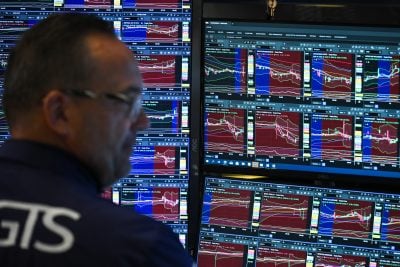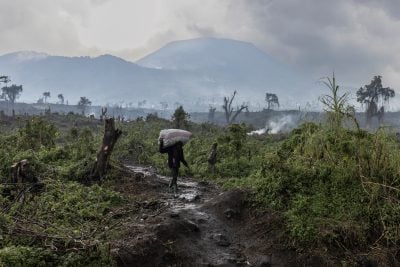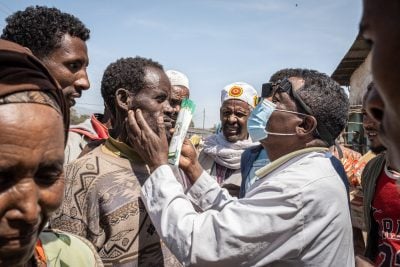The increasingly cosy relationship between South Africa and the Bretton Woods institutions (the World Bank and IMF) is probably making Nelson Mandela turn in his grave.
The World Bank’s $750m Development Policy Loan (DPL) to Pretoria at end January indicates that the red line Madiba adopted after becoming South Africa’s first democratically elected president in 1994, of not going to the Group with a begging bowl for loans, has repeatedly been crossed. Its implications are far-reaching.
President Cyril Ramaphosa first crossed that red line in July 2020 when he signed up to a $4.3bn IMF Rapid Financing Instrument. “State capture” had depleted Treasury coffers to the extent that the country had little option but to get the IMF Loan.
Pragmatism tempered with desperation seems to have trumped political principles!
“This DPL,” says the World Bank, “will contribute towards addressing the financing gap stemming from additional spending in South Africa in response to COVID-19. It reflects priorities to modernise the country’s social protection and health services and to improve delivery systems, which will apply even beyond the pandemic.”
The new normal in Pretoria’s debt management strategy is to seek more IMF-World Bank facilities in future. The reasons given by finance minister Enoch Godongwana are compelling. The loans are cheaper and long-term in nature.
But the country is beholden to them because its economy is underperforming, and thus unable to generate the required GDP growth to support the budget. South Africa has a low debt to revenue ratio which means servicing costly debts from the budget.
Godongwana signed up to the new World Bank Group Country Partnership Framework 2022–2026 in January “to help stimulate investment and job creation.” In last November’s Medium-Term Budget Policy Statement, he was preparing a nation saddled with a rising cost of living and unemployment at 34.4% for greater austerity to come.
To Dondo Mogajane, director-general of the National Treasury, “the World Bank loan will help address the immediate challenge of financing critical health and social safety net programmes whilst also continuing to develop our economic reform agenda to build back better”.
Mogajane, in a local BizNews Radio interview, spelt out the harsh realities of the country’s debt problem.
“Money is never free. The $750m DPL has a 13-year repayment period with a three-year grace period. It is a cheap loan compared to what we would have gotten in the financial market. There are no conditions attached to the loan,” he declared.
The reality is that it has a 1.92% lower yield than the equivalent South African Eurobond issuance in 2019.
The Treasury confirms public debt-service costs alone “are expected to rise from $17.77bn in 2021/22 to $24.15bn in 2024/25.” Public debt currently stands at $260bn. Last year, the Treasury paid $32.41m in servicing its World Bank debt, which stands at $1.9bn.
Poor spending record
Nevertheless, the February IMF Article IV Consultation with South Africa makes uneasy reading for Godongwana. Its baseline scenario for South Africa’s projected public debt as a percentage of GDP sees the debt burden increasing from 69.4% in 2020 to 69.9% in 2021 to 74.5% in 2022 to 77.7% in 2023 to 84.3% in 2025.
Pretoria does not have recourse to bottomless quantitative easing – central banks printing money. It turns to international agencies. The alternatives are tax revenues, raising funds in the local and international bond and Sukuk markets, the central bank issuing Treasury bills, and FDI inflows.
Critics question the effectiveness of the Bretton Woods institutions’ monitoring of the use of proceeds of its financing to South Africa. Mogajane concedes the government’s record of spending public money is poor.
“I’m not only concerned about the expenditure of the $750m. I’m concerned about the $92bn that we get every year. The Auditor General’s reports indicate irregular expenditure increases all the time,” he rued.
The government’s desperation and reliance on the IMF/World Bank is explicit. “We are running a huge deficit of $23.76bn in one year. We need money. We need the economy to function and tax revenues to come through. As long as our economy is not firing on all cylinders, we will need to borrow,” he conceded.
Mogajane’s plea “to strengthen our public oversight bodies, including boards of public entities and state-owned companies,” is the most repeated public service call to arms in South Africa! It seems Madiba will continue to spin unhappily in his grave for quite some time yet.
Want to continue reading? Subscribe today.
You've read all your free articles for this month! Subscribe now to enjoy full access to our content.
Digital Monthly
£8.00 / month
Receive full unlimited access to our articles, opinions, podcasts and more.
Digital Yearly
£70.00 / year
Our best value offer - save £26 and gain access to all of our digital content for an entire year!
 Sign in with Google
Sign in with Google 



